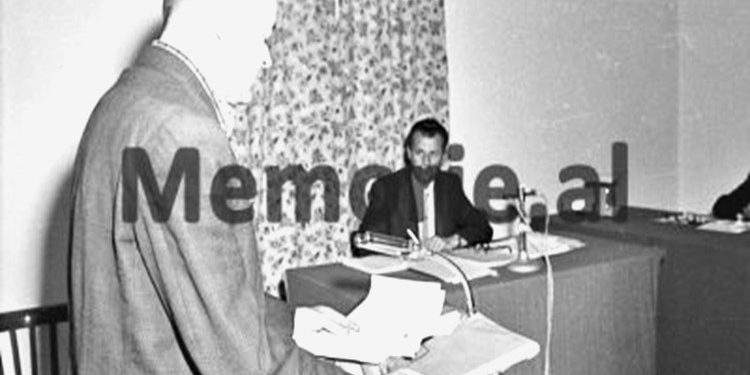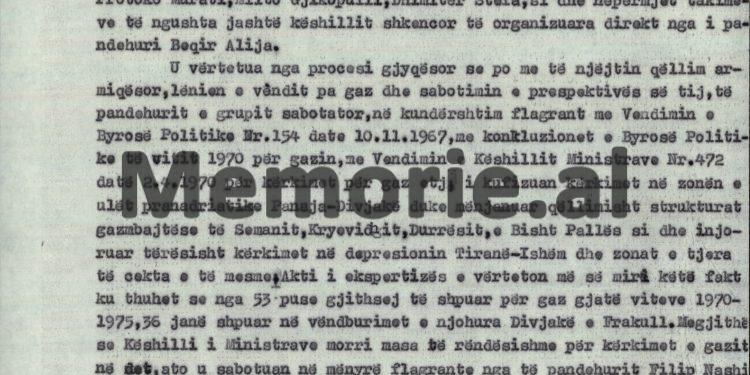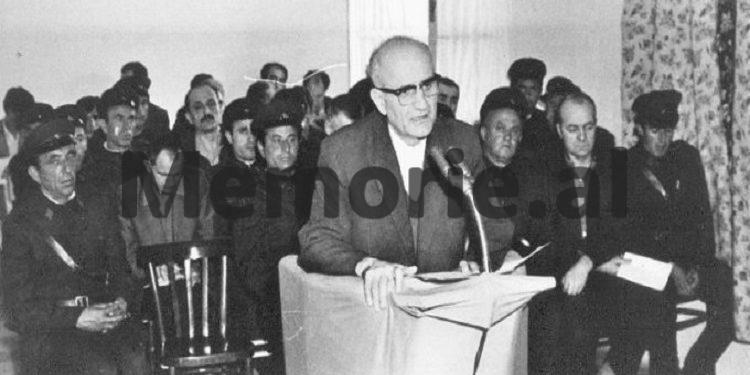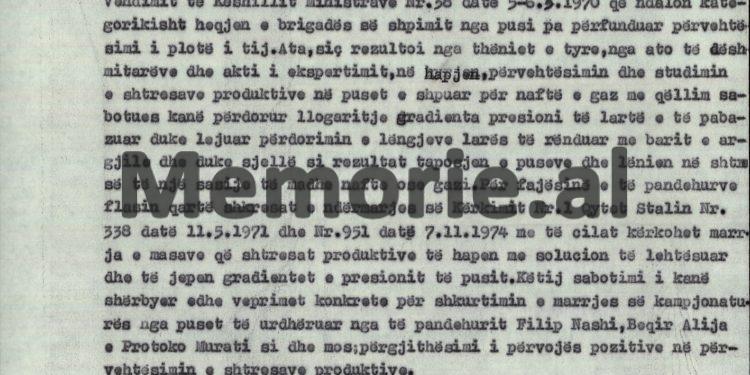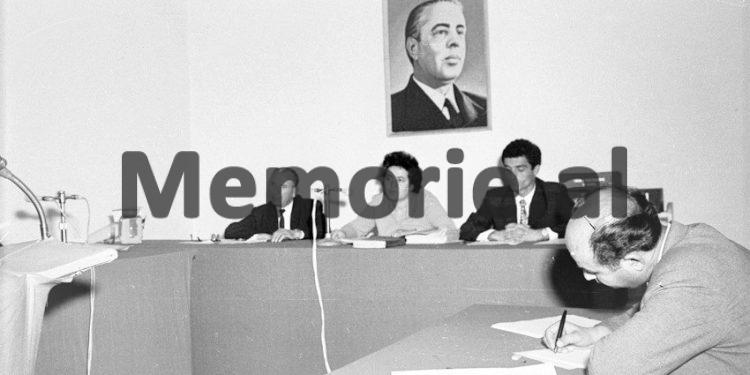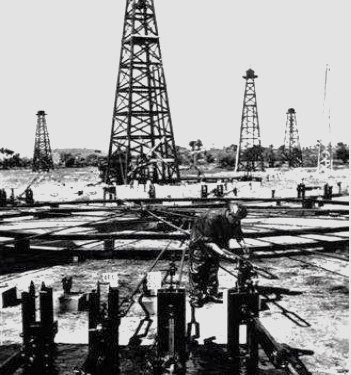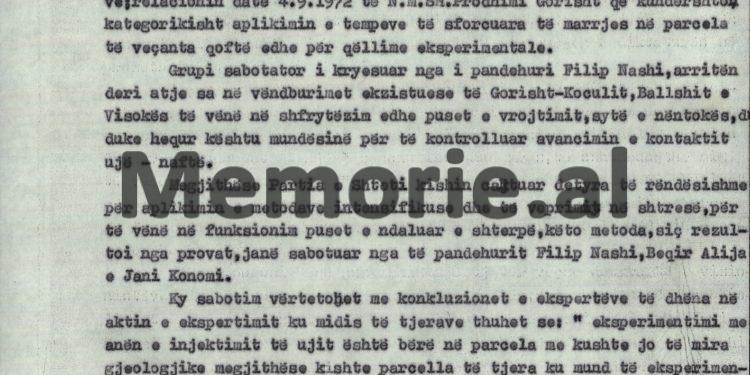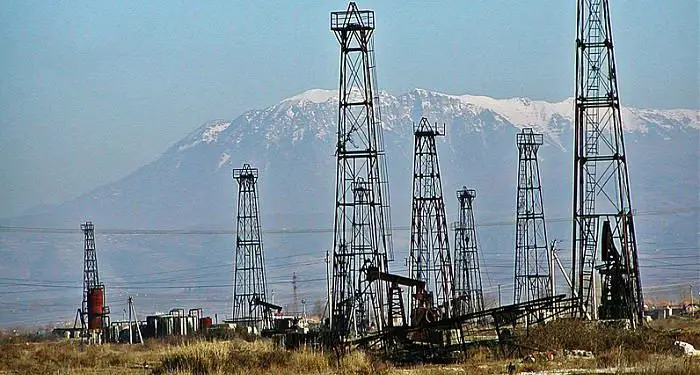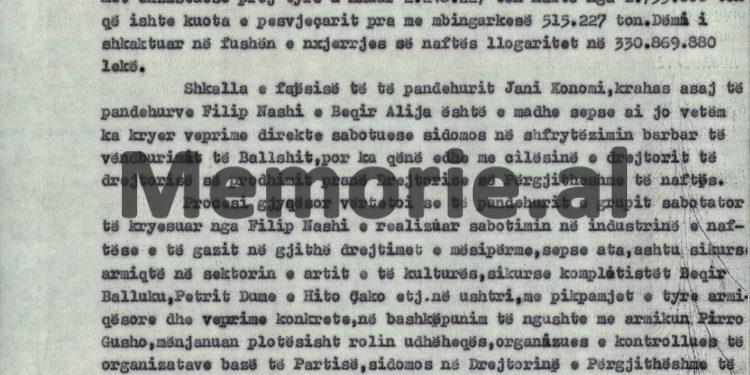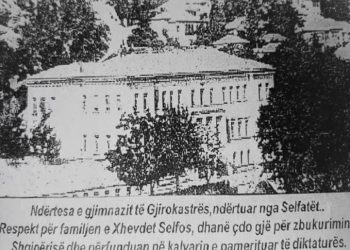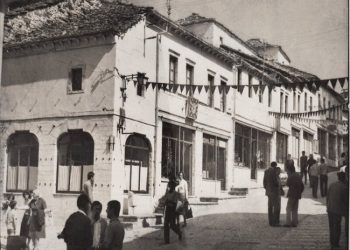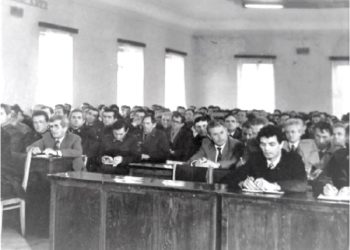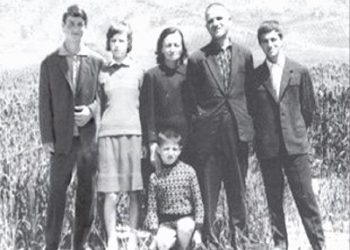By Dashnor Kaloçi
Part Ten
Memorie.al / From the end of November 1944 when he officially came to power, until he died in 1985, the communist dictator Enver Hoxha, wanting to resemble his idol, Iosif Vissarionovich Stalin and following his “path,” from time to time undertook purges in the high leadership of the ALP (Albanian Labor Party). He had practically started this as early as 1941, with Anastas Lula and Sadik Premte, continued with Koçi Xoxe (and his group) in 1948-’49, and ended it in 1981-’82 with the so-called “Hostile group of Mehmet Shehu and Kadri Hazbiu.” In this time interval of more than four decades, as is already known, he eliminated almost all the founders of the Albanian Communist Party, the members of the Political Bureau of the Central Committee of the ALP, and the main leaders of the so-called “National Anti-Fascist Liberation War.” By 1960 and until the collapse of the communist regime in 1990, only Pilo Peristeri had been spared from prison or internment, enjoying privileges as a perpetual candidate of the Political Bureau and the function of director of the “Enver Hoxha” Autotractor Combine!
But, unlike what he had done until the beginning of the 1970s, where Enver Hoxha’s “sword” had mainly fallen on the high leadership of the Albanian Communist Party (Koçi Xoxe, Kristo Themelko, Sotir Vullkani, Ramadan Çitaku, Tuk Jakova, Bedri Spahiu, Liri Gega, Gjin Marku, Koço Tashko, Liri Belishova, etc.), whom he had accused of being “deviators from the Party line” and had condemned as “traitors and enemies of the people,” in the mid-1970s, dictator Enver Hoxha began striking at some members of the Political Bureau who also held ministerial posts, such as Abdyl Këllezi and Koço Theodhosi, accusing them of being “saboteurs” of the Socialist Economy as well!
And just as he had done with Beqir Balluku, Petrit Dume, and Hito Çako (who were sentenced to death and shot), to prove their “hostile activity,” Enver Hoxha also sentenced a large group of senior officers to prisons and internment. Similarly, with the so-called “Saboteur Group of the Economy,” which, besides Këllezi and Theodhosi, also included the two ministers Kiço Ngjela and Vasil Kati, several senior officials of the Trade sector, directors, and well-known specialists like Andrea Manço, Ahmet Jegeni, Bardhyl Frashëri, etc., were also accused and condemned, as were those from the Oil sector, such as well-known leaders, engineers, and specialists like Filip Nashi, Beqir Alija, Koço Plaku, Milto Gjikopulli, Protoko Murati, Dhimitër Stefa, Jani Konomi, Nuredin Skrapari, etc.
As we will see in the documents in question, the investigative process against the so-called “Hostile and Saboteur Group of the Economy,” which the Ministry of Internal Affairs and the State Security had carried out with fabricated charges and false testimonies or those obtained under torture, etc., was continued by the High Court of the People’s Republic of Albania headed by Aranit Çela, “channeling” the accusations from a “legal” side to “prove” what Enver Hoxha had said in the Plenums of the Central Committee of the ALP against Abdyl Këllezi, Koço Theodhosi, Kiço Ngjela, Vasil Kati, etc.
Much has been said and written about all of the above since the 1990s by members of those “groups,” their family members, and others. Memorie.al has secured the archival documents of the High Court of the People’s Republic of Albania of that time and the former Presidium of the People’s Assembly, where the “Hostile Group of the Economy,” “Trade,” and “Oil” were considered. These documents, which are seeing the light of publication for the first time, are being published in several issues, along with the corresponding photos and facsimiles.
In the first and second parts of this series of articles, we are publishing documents concerning the former director of Makinaimport, Andrea Manço, originally from the village of Boboshtica in Korça, whose brother, Todo Manço, had served for years as chief engineer and director of the Bulqiza chrome mine, and also as a deputy of the People’s Assembly for several consecutive legislatures. When he passed away on November 6, 1974, a magnificent funeral ceremony was held for him with honors in the center of the capital, attended by Enver Hoxha and the entire high leadership of the ALP, headed by Prime Minister Mehmet Shehu. While Todo Manço (“Hero of Socialist Labor”) would receive all these honors, his brother, Andrea, would be tortured in the cells of the State Security about two years later and sentenced to death by firing squad as an “enemy of the people” and “agent of foreign agencies,” and his grave has not yet been found!
DECISION OF THE HIGH COURT PRESIDED BY ARANIT ÇELA, SENT TO THE PRESIDIUM OF THE PEOPLE’S ASSEMBLY, FOR THE PUNISHMENT OF THE “HOSTILE GROUP” IN THE OIL SECTOR, LED BY FILIP NASHI, BEQIR ALIJA, KOÇO PLAKU, MILTO GJIKOPULLI, ETC.
REPORT
PEOPLE’S REPUBLIC OF ALBANIA
HIGH COURT
No. 381
Tirana, 21.6.1976
To the Presidium of the People’s Assembly
Tirana
PEOPLE’S REPUBLIC OF ALBANIA
HIGH COURT
Case No. 12
Decision No. 13
DECISION
IN THE NAME OF THE PEOPLE
The High Court of the People’s Republic of Albania composed of:
Presiding Judge: Eleni Selenica, Deputy President of the High Court
Assistant Judge: Mitat Goskova
Assistant Judge: Fehmi Legreta
Assisted by the secretary Sadik Mema, with the participation of Prosecutor Sotiraq Samara, Deputy Prosecutor General, from June 11-17, 1976, considered in a closed-door court session, the criminal case No. 12 concerning the defendants:
“I,” declared the defendant Nuredin Skrapari, “when I took the map to survey the Vurgu area, I thought I shouldn’t present anything real on it, I was against the discovery of oil structures and for this, I tried to sabotage where I had the opportunity. On my part, geological phenomena that did not exist were presented on the map, and those that did exist were not presented on the map.”
The defendants themselves admitted, and the witnesses with their statements proved, that the sabotage activity regarding the discovery of new deposits was developed by organizing narrow and wide meetings and consultations with various specialists, where the opinion of the geologists was processed.
The sabotage activity, as was proven, was also developed through the Scientific Council of the Institute directed by Beqir Alija and manipulated by his collaborators, the defendants Koço Plaku, Protoko Murati, Milto Gjikopulli, Dhimitër Stefa, as well as through narrow meetings outside the scientific council, organized directly by the defendant, Beqir Alija.
The judicial process proved that with the same hostile purpose, leaving the country without gas and sabotaging its prospects, the defendants of the saboteur group, in flagrant contradiction with the Decision of the Political Bureau No. 154, dated 10.11.1967, with the conclusions of the Political Bureau of 1970 regarding gas, with the Decision of the Council of Ministers No. 472, dated 2.4.1970, regarding gas exploration, etc.; limited the explorations in the low Adriatic area of Panaja-Divjakë, intentionally avoiding the gas-bearing structures of Seman, Kryevid, Durrës, and Bisht Palla, as well as completely ignoring the explorations in the Tirana-Ishëm depression and other shallow and medium zones.
The expert report best proves this fact, where it is stated that out of 53 wells drilled for gas in total during the years 1970-1975, 36 were drilled in the known deposits of Divjakë and Frakull. Although the Council of Ministers took important measures for gas exploration at sea, they were flagrantly sabotaged by the defendants Filip Nashi and Beqir Alija and other collaborators until the Durrës region was finally abandoned.
The history of gas exploration in the Durrës structure, the expert report states, after 1965 and especially after 1970, is one of the typical examples of sabotage work. The defendants Filip Nashi, Beqir Alija, and Milto Gjikopulli gave detailed explanations for this sabotage, admitting that with all sorts of machinations, but with the purpose of sabotage, the work for gas exploration was not developed, pushing it from one year to the next, as if they were not prepared and lacked experience.
By extending too many areas of the country, into structures completely unprepared with complex geological-geophysical works, by attacking the structures with as many deep structural wells as possible, not to find oil and gas, but to clarify the structures, the defendants of the saboteur group led to the construction of unnecessary foundations and roads. As a result of their sabotage activity in the Saranda area, a series of surface objects were built unnecessarily and with such constructions alone, an economic damage of 15,852,211 ALL was caused to the State. The above facts were proven in the statements of many witnesses, in the expert report, and the confessions of the defendants themselves.
The judicial process also proved that the defendants, with the intent of sabotage, acted in contradiction with point 8, Chapter II of the Decision of the Council of Ministers, No. 38, dated 5-6.3.1970, which categorically prohibits the removal of the drilling crew from the well without its full completion. They, as resulted from their statements, those of witnesses, and the expert report, in the opening, completion, and study of the productive layers in the wells drilled for oil and gas, for the purpose of sabotage, used calculations of high and unfounded pressure gradients, allowing the use of heavy washing fluids with barite and clay, and as a result, leading to the plugging of the wells and leaving a large amount of oil or gas in the layer.
The enterprise documents speak clearly about the guilt of the defendants: “City of Stalin” Search Enterprise No. 1, No. 338, dated 11.5.1971, and No. 951, dated 7.11.1974, which requested measures to open the productive layers with a lighter solution and to provide the well’s pressure gradients. This sabotage was also served by concrete actions to shorten the taking of samples from the wells, ordered by the defendants Filip Nashi, Beqir Alija, and Protoko Murati, as well as the failure to generalize the positive experience in the completion of the productive layers.
With the goal of leaving the country without oil and gas, after sabotaging the prospect of the development of the Oil and Gas industry, the defendants also widely extended their sabotage activity to the liquidation of existing deposits by exploiting them in the most barbaric way. Numerous data from the investigative process verified during the trial, the statements of many witnesses, countless written documents, the conclusions of the group of experts, and the confessions of the defendants proved that the sabotage activity in the direction of exploiting existing deposits was oriented and supported by the enemies Beqir Balluku and Piro Gusho, as well as directly incited by the hostile elements who headed the State Planning Commission and the Ministry of Industry and Mines.
The defendants Filip Nashi, Beqir Alija, and Jani Konomi drafted the production plans and corrected them, overloading the existing deposits with production beyond their capabilities, even though they knew and were aware of the consequence that would come—the inundation and flooding of the deposits. Thus, the defendant Filip Nashi stated that Beqir Balluku told him in Fier, with Pirro Gusho also present, to “extract oil now, because for the reserves… generations will work,” to “open those taps and nozzles of the wells, because that’s how production increases… Look at the year, because the 5-year plan is far away,” which means barbarically exploit the deposits, sabotage.
This fact clearly shows that the sabotage in oil is an integral part of the great plot that aimed to overthrow the dictatorship of the proletariat in our country. Besides this, it was proven that the sabotage in the direction of exploiting existing deposits was also carried out, oriented by foreign enemies. In 1970, the defendants Filip Nashi and Jani Kononi, meeting in Budapest with a Hungarian “specialist,” a so-called friend of our country, received “directives” to exploit limestone deposits with large depressions, supposedly to increase production, but in fact, this method of exploitation led to the blocking and liquidation of wells and deposits.
These “orders,” which were nothing other than tasks of the revisionists to sabotage the oil industry, were spread among specialists and were eagerly implemented by the defendant Jani Kononi, incited by the defendant Lipe Nashi. In the deposits of Ballsh, Visoka, and Gorisht-Kocul, the well regimes were raised, exploiting them with depressions above the allowed limit and with flow rates above the critical one. In the Ballsh deposit, where the defendant Jani Kononi for a time also served as the director of the production enterprise, openly in opposition to the opinion of workers and specialists and secretly, the wells were also exploited from the tubing and casing, taking very high flow rates above the maximum, which led to the complete flooding of individual wells and entire areas of the deposits.
The defendant Beqir Alija, on the other hand, in the terrigenous deposits, implemented the joining of objects 1 and 2 of the Drizas in Patos and Marinza, causing severe damage to the deposits. For sabotage purposes and not for studies, experimental plots were used in the Gorisht-Kocul deposit to extract oil at high tempos above the rational ones. Determined to carry their criminal sabotage activity to the end, to leave the country without oil, by flooding and inundating the deposits and wells, the defendants did not stop even before the serious concerns of the workers, but over-exploited the deposits with overloading, coming out with the demagogic slogan; “The homeland needs oil,” “The plan is the law, it cannot be discussed,” slogans most often used by the defendants Filip Nashi, Beqir Alija, and Jani Kononi.
Thus, they ignored the document dated 19.9.1972 addressed to D.P.N. from the collective of workers of N.N. Marinza which opposed the joining of objects 1 and 2 of the Drizas, the report dated 4.9.1972 of N.M.SH. Prodhini Gorisht which categorically opposed the application of forced tempos of extraction in specific plots even for experimental purposes. The saboteur group headed by the defendant Filip Nashi went so far as to put even observation wells, the eyes of the underground, into exploitation in the existing deposits of Gorisht-Kocul, Ballsh, and Visoka, thus removing the possibility of controlling the advancement of the water-oil contact.
Although the Party and the State had set important tasks for the application of intensifying methods and action in the layer to put the stopped and barren wells into operation, these methods, as resulted from the evidence, were sabotaged by the defendants Filip Nashi, Beqir Alija, and Jani Konomi. This sabotage is confirmed by the conclusions of the experts given in the expert report, where among other things it is stated that: “the experimentation on the side of water injection had been done in plots with poor geological conditions, even though there were other plots where this method could be experimented with, and this method was dragged on for over 5 years, finally giving up with the argument of “economic infeasibility.” The underground burning method was delayed by the defendant Filip Nashi, and in the stopped wells, numerous and repeated works were carried out, but without effectiveness. For many meetings and gatherings, the witnesses and defendants spoke, through which the sabotage was deepened by setting paths and forms for the barbaric exploitation of existing deposits, where the plans for the production of oil extraction for various deposits were calculated and recalculated, and where the main role was played by the enemies Filip Nashi, Beqir Alija, and Jani Konomi, but their collaborators Protoko Murati, Koço Plaku, Milto Gjikopulli, and Dhimitër Stefa were also not absent, who, as “affirmed specialists,” had to give their lesson because they had common goals—leaving the country without oil.
This great sabotage in the direction of exploiting existing deposits is clear from the data of the expert report, which states that in Visoka, 70% of the wells in exploitation have been inundated and which cover 85% of the oil-bearing area. In Ballsh, 65% of the exploitation wells have been inundated and which occupy 70% of the oil-bearing area. In Gorisht-Kocul, 20% of the exploitation wells have been inundated and which occupy 18% of the oil-bearing area. In 1974, the expert report continues, after many changes in the plans of the enterprises for oil extraction from the existing deposits, 2,248,227 tons of oil were taken from them, from 1,733,000 tons, which was the quota of the five-year plan, i.e., with an overload of 515,227 tons. The damage caused in the field of oil extraction is estimated at 330,869,880 ALL.
The degree of guilt of the defendant Jani Kononi, alongside that of the defendants Filip Nashi and Beqir Alija, was great because he not only carried out direct sabotage actions, especially in the barbaric exploitation of the Ballsh deposit, but he also held the position of director of the Production Directorate, near the General Directorate of Oil. The judicial process proved that the defendants of the saboteur group, headed by Filip Nashi, carried out the sabotage in the Oil and Gas industry in all the above directions, because they, just like the enemies in the sector of Art and Culture, just like the plotters Beqir Balluku, Petrit Dume, and Hito Çako, etc., in the Army, with their hostile views and concrete actions, in close cooperation with the enemy, Pirro Gusho, completely sidelined the leading, organizing, and controlling role of the basic Party organizations, especially in the General Directorate of Oil and in the Institute of Oil and Gas. / Memorie.al




